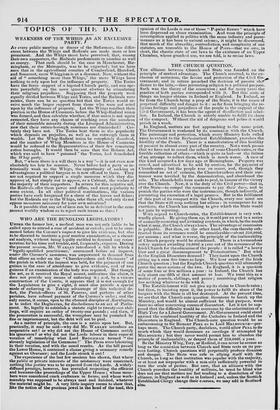WHO ARE THE BUNGLING LEGISLATORS ?
UNDER the former law, a medical man was not only liable to be called upon to attend a case of accident or suicide, and to be sum- moned before the Coroner's inquest to give his evidence, but also to be directed to institute a post mortem examination, or a chemi- cal analysis, wilhout being legally entitled to demand any remu- neration for his time and trouble, and, frequently, expense. During the present session, Mr. WAKLEY introduced a bill by which a "legally-qualified practitioner," summoned before an inquest, under the Coroner's summons, was empowered to demand from that officer an order on the "Churchwardens and Overseers" of the parish in which the inquest was held, for the payment of one guinea in the case of attendance to give evidence, and of two guineas if an examination of the body was required. But though the act, as it received the Royal assent, authorizes the clairs, it does not provide any means of enforcing it ; and, by a vicious construction of the Courts, it appears that it is-not enough for the Legislature to give a right, it must also provide a special mode of enforcing it. Taking advantage of this technical de- fect, the Parish-officers of St. Pancras, and perhaps of other parishes, have refused payment of the Coroner's order; and the only course, it seems, open to the choused disciples of sEsculaphis, is to indict the Dogberries, for disobedience to an act of Parlia- ment. Se, legally to establish a statute right to twenty-one shil- lings, will require an outlay of twenty-one pounds ; and then, if the prosecution is successful, the wrongdoer may be punished by fine or imprisonment, but the debt will not be paid.
As a matter of principle, the case is a satire upon law. But, practically, it may be said—why did Mr. WAKLEY introduce an inoperative act? or why did not the House of Commons rectify his ignorance? or why did not the Lords labour in their especial vocation of remedying what Lord BROUGHAM termed " the slovenly legislation of the Commons ?" The Peers were labouring in their vocation, and with the usual results. As the bill passed the Lower House, it contained a clause giving a summary remedy against an Overseer; and the Lords struck it out !
The experience of the last few sessions has shown, that where the public or private interests of the aristocracy were concerned, nothing like justice was to be expected from the Lords. A widely- diffused prestige, however, has prevailed respecting the efficient and business-like proceedings of the Upper Ilouse ; whose mem- bers were considered crack craftsmen in limns, and whose work- manship was supposed to be always neat and finished, whatever the material might be. A very little inquiry seems to show that, like the notion of the precious jewel in the head of the toad, this
opinion of the Lords is one of those " Popular Errors " which have been disproved on closer examination. And were the principle of investigation applied to politics with the same industry and perse- verance as it has been to natural science, it might be discovered, that much of the absurdity, contradiction, and complexity of our statutes, are traceable to the House of Peers—that we owe, in short, the chaotic state of our laws to the existence of an Upper Chamber, whose grandest use, we are told, is to revise laws.


























 Previous page
Previous page